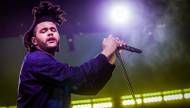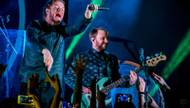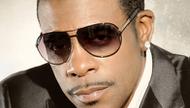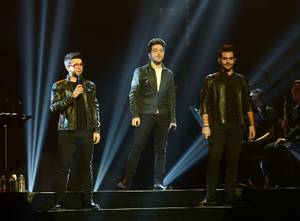
Janelle Monáe June 26, the Pearl.
Despite the fact that Janelle Monáe “officially” came out in Rolling Stone’s April cover issue—and that her music videos have been increasingly focused on LGBTQIA visibility—I didn’t know how much her current tour supporting this year's acclaimed Dirty Computer album would delve into those themes during her Palms show on Tuesday night. Would she skirt around those topics like she had in years past, or would she embrace her newfound freedom, incorporating her identity and community into each successive song?
Monáe’s performance most certainly fell into the latter category, as the singer took multiple opportunities to address marginalized people: LGBTQIA folks, people of color, immigrants and more. And while Vegas doesn’t celebrate Pride until October, Monáe's show was the queer, in-your-face, unabashed celebration of love and unity that we nonetheless needed.
Multiple wardrobe changes showcased Monáe's provocative, imaginative eye—most of her outfits drawing inspiration from military garb and traditional African dress (think Street Fighter’s M. Bison meets Major Lazer). She opened with her Dirty Computer cut “Crazy, Classic, Life,” hitting high notes and rapping with ease, but it wasn’t until the first wardrobe change—four songs in—that the queen truly arrived.
Sitting in a gold and red throne and cloaked in deep scarlet light, Monáe unleashed the fury as her fearless character Django Jane, singing the song of the same name. Wearing a long, black-and-white checkered suit dress and a West African kufi hat (traditionally worn by men), Monáe sent chills through the entire Pearl Theater as she descended a white pyramid of stairs, a black panther baring its fangs on the screen behind her as she rapped: “Remember when they used to say I look too mannish/Black girl magic, y'all can't stand it/Y'all can't ban it, made out like a bandit/They been trying hard just to make us all vanish.”
That set the tone for the rest of the show—unapologetically black, queer and feminist—backed by one of the best live bands I’ve heard at a pop show, comprised of all POC and mostly women—including a female bassist, keyboardist and trumpet player.
Monáe also stunned with her dance moves, harkening back to the glory days of Michael Jackson, as the ArchAndroid moonwalked across the length of the stage. “You guys found out a little bit more about how I like to love,” Monáe said before wishing the crowd a happy Pride. “You are loved no matter who or how you love … and if you didn’t come tonight with somebody, I love you. I love all y’all.” That sentiment returned later in the set, after Monáe emerged in her much-talked-about p*ssy pants for “Pynk” and her dancers writhed around the stage in leotards and crop tops for “Yoga.”
“This song is dedicated to everybody in here who was ever made fun of—for how you look, how you dress, how you wear your hair … this is for all the people who embrace what’s unique,” she said before singing “I Like That.” At the end of the song, the singer pointed out people from the crowd, complimenting them as she went. “Your shorts—I like it. Your dreads—I like it. Your flag,” she said pointing to a Pride flag. “I like it.” Whether you were seated on the floor or in the balcony, in that moment, the show felt intensely intimate and personal.
It didn’t stop there. Before the show ended, Monáe pulled four fans onstage, addressed rights regarding the LGBTQIA, women, immigrant and minority communities, talked about mental health and her own battle with depression last year, and paid homage to her late and great mentor, Prince.
Given the amount of love and pride that Monáe injected into her show, the singer closed the all-out production in the only way that made sense—with a performance of her final song off Dirty Computer, “Americans.”
“Until women can get equal pay for equal work/This is not my America/Until same gender loving people can be who they are/This is not my America/Until black people can come home from a police stop without being shot in the head/This is not my America,” she sang as the Stars and Stripes, albeit filtered with rainbow colors, flew on the screen behind her—a symbol of hope, love and home for which so many continue to fight.








